- Home
- V. E. Schwab
Gallant Page 2
Gallant Read online
Page 2
When Olivia was small, she thought that she was the “you,” that her mother was speaking to her across time, those three letters a hand, reaching through paper.
If you read this, I am safe.
I dreamed of you last night.
Do you remember when . . .
But eventually, she came to understand the “you” was someone else: her father.
Though he never answers, her mother writes on as if he has, entry after entry full of strange, veiled terms of their courtship, of birds in cages, of starless skies, writing of his kindness and her love and fear, and then, at last, of Olivia. Our daughter.
But there her mother begins to unravel. She begins to write of shadows crawling like fingers through the dark, and voices carried on the wind, calling her home. Soon her graceful script begins to tip, before tumbling over the cliff into madness.
That cliff? The night her father died.
He was ill. Her mother spoke of it, the way he seemed to wane as her belly waxed, some wasting sickness that stole him weeks before Olivia was born. And when he died, her mother fell. She broke. Her lovely words went jagged, the writing came apart.
I am sorry I wanted to be free sorry I opened the door sorry you’re not here and they are watching he is watching he wants you back but you are gone he wants me but I won’t go he wants her but she is all I have of you and me she is all she is all I want to go home
Olivia doesn’t like to linger on these pages, in part because they are the ramblings of a woman gone mad. And in part because she’s forced to wonder if that madness is the kind that lingers in the blood. If it sleeps inside her, too, waiting to be woken.
The writing eventually ends, replaced by nothing but a blank expanse, until, near the back, a final entry. A letter, addressed not to a father, living or dead, but to her.
Olivia Olivia Olivia, her mother writes, the name unravelling across the page, and her gaze drifts over the ink-spotted paper, fingers tracing the tangled words, the lines drawn through abandoned text as her mother fought to find her way through the thicket of her thoughts.
Something flickers at the edge of Olivia’s sight. The ghoul, nearer now, peers sheepishly over the mound of Clara’s pillow. It tilts its head, as if listening, and Olivia does the same. She can hear them coming. She shuts the journal.
Seconds later, the doors swing open and the girls pour in.
They chirp and chime as they spill across the room. The younger ones glance her way and whisper, but as soon as she looks back, they skitter past, like insects, to the safety of their sheets. The older ones do not look at all. They pretend she is not there, but she knows the truth: They are afraid. She has made sure of it.
Olivia was ten when she showed her teeth.
Ten, and walking down the hall, only to hear her mother’s words in someone else’s mouth.
“These dreams will be the death of me,” it said. “When I am dreaming, I know that I must wake. But when I wake, all I think about is dreaming.”
She reached the dorms to find silver-blonde Anabelle sitting primly on her bed, reading the entry to a handful of snickering girls.
“In my dreams, I am always losing you. In my waking, you are already lost.”
The words sounded wrong in Anabelle’s high lilt, her mother’s madness on full display. Olivia marched over and tried to take the journal back, but Anabelle darted out of reach, flashing a wicked grin.
“If you want it,” she said, holding the journal aloft, “all you have to do is ask.”
Olivia’s throat tightened. Her mouth opened, but nothing came out, just a rush of air, an angry breath.
Anabelle snickered at her silence. And Olivia lunged. Her fingers skimmed the journal, before two more girls pulled her back.
“Ah, ah, ah,” teased Anabelle, wagging a finger. “You have to ask.” She sidled closer. “You don’t even have to shout.” She leaned in, as if Olivia could simply whisper, shape the word please and set it free. Her teeth clicked together.
“What’s wrong with her?” sneered Lucy, scrunching up her nose.
Wrong.
Olivia scowled at the word. As if she hadn’t stolen into the infirmary the year before, hadn’t scoured the anatomy book, hadn’t found the drawings of the human mouth and throat and copied every single one, hadn’t sat up in bed that night, feeling along the lines of her own neck, trying to trace the source of her silence, trying to find exactly what was missing.
“Go on,” goaded Anabelle, holding the journal high. And when Olivia still said nothing, the girl flicked open the book that was not hers, exposing the words that were not hers, touching the paper that was not hers, and began to tear the pages out.
That sound, the ripping of paper from seam, was the loudest in the world, and Olivia tore free of the other girls’ hands and fell on Anabelle, fingers wrapped around her throat. Anabelle yelped, and Olivia squeezed until the girl could not speak, could not breathe, and then the matrons were there, pulling them apart.
Anabelle sobbed, and Olivia scowled, and both girls were sent to bed without supper.
“It was just a bit of fun.” The other girl sulked, collapsing onto her bed as Olivia silently, painstakingly, tucked the torn pages back into her mother’s journal, holding close the memory of Anabelle’s throat beneath her hands. Thanks to the anatomy book, she’d known exactly where to squeeze.
Now she runs her finger down the journal’s edge, where the torn pages stick out farther than the rest. Her dark eyes flick up as she watches the girls file in.
There is a moat around Olivia’s bed. That is what it feels like. A small, invisible stream that no one will cross, rendering her cot a castle. A fortress.
The younger girls think she is cursed.
The older ones think she is feral.
Olivia doesn’t care, so long as they leave her alone.
Anabelle is the last one in.
Her pale eyes dart to Olivia’s corner, one hand going to her silver-blonde braid. Olivia feels a smile rise to her lips.
That night, after the torn-out pages were safely back inside their book, after the lights were out and the girls of Merilance were all asleep, Olivia got up. She crept into the kitchen, and took an empty mason jar, and went down into the cellar, the kind of place that is somehow always dry and damp at once. It took an hour, maybe two, but she managed to fill the jar with beetles, and spiders, and half a dozen silverfish. She added a handful of ash from the head matron’s hearth, so the little bugs would leave their mark, and then she crept back into the dormitory and opened the jar over Anabelle’s head.
The other girl woke screaming.
Olivia watched from her bed as Anabelle pawed at the sheets and tumbled out onto the floor. Around the room, the girls all shrieked, and the matrons came in time to see a silverfish wriggle out of Anabelle’s braid. Nearby, the ghoul watched, shoulders bobbing in a silent chuckle, and as Anabelle was led sobbing from the room, the ghoul held up a bony finger to its half-formed lips, as if vowing to keep the secret. But Olivia didn’t want it to be a secret. She wanted Anabelle to know exactly who’d done it. She wanted her to know who made her scream.
By breakfast, Anabelle’s hair had been lopped short. She looked straight at Olivia, and Olivia stared back.
Go on, she thought, holding the other girl’s gaze. Say something.
Anabelle didn’t.
But she never touched the journal again.
It’s been years now, and Anabelle’s silver-blonde hair has long grown back, but she still touches the braid every time she sees Olivia, the way the girls are told to cross themselves or kneel at service.
Every time, Olivia smiles.
“Into bed,” says a matron—it doesn’t matter which. And soon the lights go out, and the room is still. Olivia climbs beneath the scratchy blanket and curls her spine into the wall and hugs the journal to her chest and closes her eyes against the ghoul and the girls and the world of Merilance.
Olivia Olivia Olivia
I have been whispering the name into your hair
so you will remember will you remember?
I don’t know I can’t They say there is love in
letting go but I feel only loss. My heart is ash and
did you know ash holds its shape until you touch it
I do not want to leave you but I no longer trust myself
there is no time there is no time there is no time to
I’m so sorry I don’t know what else to do
Olivia, Olivia, Olivia, Remember this—
the shadows cannot touch are not real
the dreams are only dreams can never hurt you
and you will be safe as long as you stay away
from Gallant
Chapter Three
Olivia has been buried alive.
At least, that is how it feels. The kitchen is such a stuffy place, in the bowels of the building, the air clogged with pot steam and the walls made of stone, and whenever Olivia is forced to work in here, she feels as if she’s been entombed. She wouldn’t mind it so much, if she were alone.
There are no ghouls down in the kitchen, but there are always girls. They chitter and chat, filling the room with noise, just because they can. One is telling a story about a prince and a palace. One is moaning about cramps, and the other sits on the counter, swinging her legs and doing absolutely nothing.
Olivia tries to ignore them, focusing instead on her bowl of potatoes, the paring knife glinting dully in her palm. She studies her hands as she works. They are thin, unlovely but strong. Hands that can speak, though few at the school bother to listen, hands that can write and draw and stitch a perfect line. Hands that can part skin from flesh without slipping.
There is a small scar, between her finger and thumb, but that was a long time ago, and it was her own doing. She had heard the other girls holler when they hurt themselves. A sharp cry, a long wail. Hell, when Lucy tried to jump between the cots one day and missed and broke her foot, she bellowed. And Olivia had wondered, almost absently one day, if her voice lay on the other side of some threshold, if it could be summoned forth with pain.
The knife was sharp. The cut was deep. Blood welled and spilled onto the counter, and heat screamed up her arm and through her lungs, but only a short, sharp gasp escaped her throat, more emptiness than sound.
When Clara saw the blood, she yelped, a high disgusted noise, and Amelia called for the matrons, who assumed it was an accident, of course. Clumsy thing, they tutted and tsked, while the other girls whispered. Everyone, it seemed, so full of noise. Except Olivia.
She, who wanted to scream, not in pain but sheer exasperated fury that there was so much noise inside her, and she could not let it out. She’d kicked over a pile of pots instead, just to hear them clang.
Across the kitchen, the girls have turned to talk of love.
They whisper as if it’s a secret or a stolen sweet, palmed and kept inside their cheeks. As if love is all they need. As if they have been placed under a curse and only love will set them free. She does not see the point in that: love did not save her father from illness and death. It did not save her mother from madness and loss.
The girls say love, but what they really mean is want. To be wanted, beyond the walls of this house. They are waiting to be rescued by one of the boys who linger at the edge of the gravel moat, trying to lure them across.
Olivia rolls her eyes at the mention of favors and promises and futures.
“What would you know?” sneers Rebecca, catching the look. She is a reedy girl with eyes too small and too close. More than once, Olivia has drawn her as a weasel. “Who would want you?”
Little does she know, there was a boy that spring. He caught her coming from the shed. Their eyes met, and he smiled.
“Come talk to me,” he said, and Olivia frowned and withdrew into the house. But the next day, he was there again, a yellow daisy in one hand. “For you,” he said, and she wanted the flower more than his attention, but still she drifted across the moat. Up close, his hair caught like copper in the sun. Up close, he smelled of soot. Up close, she noticed his lashes, and his lips, with the distance of an artist studying her subject.
When he kissed her, she waited to feel whatever her mother had felt for her father, the day they met, the spark that lit the fire that burned their whole world down. But she only felt his hand on her waist. His mouth on her mouth. A hollow sadness.
“Don’t you want it?” he’d asked when his hand grazed her ribs.
She wanted to want it, to feel what the other girls felt.
But she didn’t. And yet, Olivia is full of want. She wants a bed that does not creak. A room without Anabelles or matrons or ghouls. A window and a grassy view and air that does not taste of soot and a father who does not die and a mother who does not leave and a future beyond the walls of Merilance.
She wants all those things, and she has been here long enough to know that it does not matter what you want—the only way out is to be wanted by someone else.
She knows, and still, she pushed him away.
And the next time she saw the boy, at the edge of the yard, he was leaning toward another girl, a pretty little wisp named Mary, who giggled and whispered in his ear. Olivia waited for the flush of envy, but all she felt was cool relief.
She finishes skinning a potato and studies the little paring knife. Balances it on the back of her hand before flicking it gingerly into the air and catching the grip. She smiles, then, a small private thing.
“Freak,” mutters Rebecca. Olivia looks up, holds her eye, and wags the knife like a finger. Rebecca scowls and turns her attention to the other girls, as if Olivia is a ghoul, something to be ignored.
They move on from boys, at least. Now they are talking about dreams.
“I was at the seaside.”
“You’ve never been to the sea.”
“So what?”
Olivia takes up another potato, slides the knife under the starchy skin. She is almost done, but she slows her work, listening to them prattle.
“So how do you know it was the seaside and not a lake?”
“There were seagulls. And rocks. And besides, you don’t need to know about a place to dream of it.”
“Of course you do . . .”
Olivia quarters the spud and drops it in the pot.
They talk of dreams as if they’re solid things, the kind you might mistake for real. They wake with whole stories impressed upon their minds, images committed to memory.
Her mother spoke of dreams as well, but hers were crueler things, filled with dead lovers and clawing shadows, sharp enough that she felt the need to warn her daughter they were not real.
But her mother’s warning is wasted.
Olivia has never had a dream.
She imagines things, of course, conjures other lives, pretends she is someone else—a girl with a large family and a grand house and a garden bathed in sun, fanciful things like that—but not once, in fourteen years, has she been visited by dreams. Sleep, when it comes, is a dark tunnel, a shroud of black. Sometimes, right after she wakes, there is a kind of filament, like spider silk, clinging to her skin. That strange sense of something just out of reach, an image bobbing on the surface before rippling away. But then it’s gone.
“Olivia.”
Her name cuts through the air. She flinches, fingers tensing on the knife, but it is only the thin-faced matron, Jessamine, waiting at the door, lips pursed as if she’s got a lemon on her tongue. She crooks her finger, and Olivia abandons her station.
Heads swivel. Eyes follow her out.
“What has she done now?” they whisper, and honestly, she doesn’t know. It could have been the lockpicks she fashioned, or the sweets she stole from Matron Agatha’s drawer, or the chalkboard buried in the cellar.
She shivers a little as they climb the stairs, trading the stuffy kitchen for the chilly halls beyond. Her heart sinks at the sight of the head matron’s door. Never a good sign, to be summoned here.
r /> Jessamine knocks, and a voice answers from the other side.
“Come in.”
Olivia clenches her jaw, teeth clicking softly together as she steps inside.
It is a narrow room. The walls are lined with books, which would be welcoming if they were stories of magic or pirates or thieves. Instead, thick spines bear titles like The Lady’s Book of Etiquette and Pilgrim’s Progress, and a full shelf of encyclopedias that as far as she knows have only been used to enforce good posture.
“Miss Prior,” says the bony figure at the dark wood desk.
The head matron of Merilance is old. She has always been old. Aside from the addition of a few new wrinkles in an already-lined face, she has not changed in all the time Olivia has lived here. Her shoulders do not hunch, her pale eyes never blink, and her voice, when she speaks, is as thin and efficient as a switch.
“Sit.”
There are two chairs in the room. A thin wooden one against the wall, and a faded green one before the desk.
The one against the wall is already taken. A thin little ghoul sits, bent forward, legs swinging back and forth, too short to touch the floor. Olivia stares at the half-formed girl, wondering who would choose to haunt this room of all the ones in Merilance.
The head matron clears her throat. The sound is a bony hand, pinching Olivia’s chin.
The ghoul dissolves back into the wooden boards, and Olivia forces herself forward and takes a seat in the faded green chair, sending up a plume of dust. She stares blandly at the old woman, hoping the expression reads as dull, but unfortunately, the head matron of Merilance has never been polite enough to underestimate Olivia. To take her silence for stupidity, or even disinterest. Laid before the old woman’s blue-eyed gaze she feels unmoored, exposed.
“You have been with us for quite some time,” says the head matron, as if Olivia doesn’t know. As if she’s lost track of the years, the way a prisoner might within a cell. “We have cared for you since you were a child. Nurtured you as you grew into a young woman.”

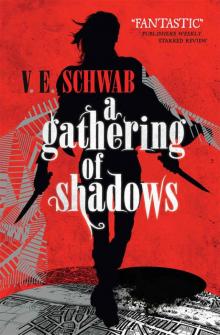 A Gathering of Shadows
A Gathering of Shadows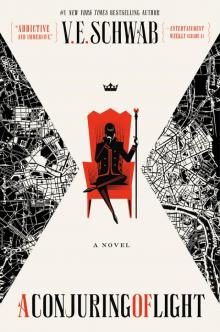 A Conjuring of Light
A Conjuring of Light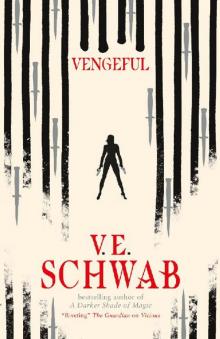 Vengeful
Vengeful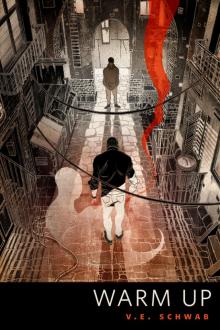 Warm Up
Warm Up The Near Witch
The Near Witch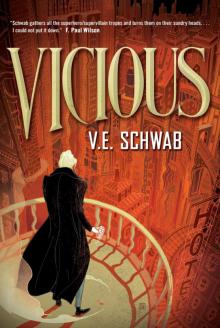 Vicious
Vicious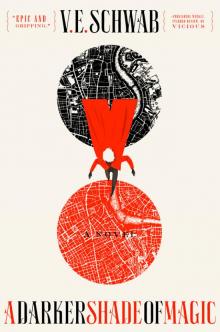 A Darker Shade of Magic
A Darker Shade of Magic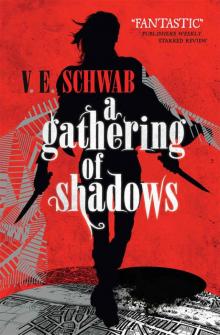 Gathering of Shadows (A Darker Shade of Magic)
Gathering of Shadows (A Darker Shade of Magic)